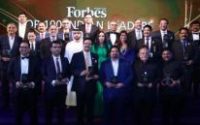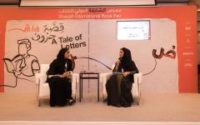Social Media Should Not Control Our Lives, We Should Control It: Najwa Karam
Social media is not journalism, but a form of communication, say experts
Social media should not control our lives, rather we should control what we post in public, famous Arab singer Najwa Karam told the media at a session titled ‘The Ever-Changing Journey in Arts’.
Karam, a celebrity in her own right, said she uses social media to interact with her fans and followers. “People from all backgrounds send their feedback and while I interact with them on Facebook, YouTube or Twitter, some people make money, without us getting royalty.
“I would like to tell the audience to think of their posts on social media, what they are posting and how will it impact society, especially, the next generation.
“Think of the legacy you are leaving behind for the next generation,” she said, when talking about cyber bullying and the posting of negative and malicious comments.
“Since one is free to post whatever one wishes and we believe in democracy and in social media as a tool for airing our opinion, we should do so with a sense of responsibility and dignity. Think of your children when you post something negative and how they will view this when they find the post.”
Social Media is a form of communication, but not journalism, another celebrity Ali Jaber, Director of MBC Television, said. “Somehow people are mixing journalism with social media – which is very personal and the content is not verified by professionals. Let me say very clearly that social media is not journalism, it’s a form of communication,” he said.
“On the other hand, journalism is a profession and there are very critical issues involved, such as authenticity, fact-checking, verification and credibility. There are professional standards for writing or disseminating this content.
“There are multiple layers in story-telling in journalism. In social media, anyone can post anything and that’s where the problem lies. When you remove the gate-keeper, you allow yourself more personal interaction, not professional story-telling. It’s a form of communication and not journalism.”
Ali Jaber said that television channels should not be held responsible for the health of society. “We air some of the best content and it is up to the consumers to benefit from them. We are one of the stakeholders of society, but there are others, such as the family, educational institutions, leadership that shape the health of society.”
He said cyber-bullying has been in practice for some time. However, due to social media, it has become more intense. “A lot of us are facing it now more than ever. It is a social disease and it reflects the sick mentality of whoever is posting it,” he said.
Najwa Karam asked people not to use fake accounts to spread rumours or fake content. “In this world, we all have our preferences, likes and dislikes and in a free and democratic world, one is free to air one’s feelings and I am okay with that. What I don’t want to see is people using fake accounts to spread malicious or negative content. That should stop.”
Held under the patronage of Vice President and Prime Minister of the UAE and Ruler of Dubai His Highness Sheikh Mohammed bin Rashid Al Maktoum at Madinat Jumeirah, Dubai, from 3-4 April 2018, the 17th edition of the Arab Media Forum (AMF) brought together more than 3,000 prominent regional and international media figures and thought leaders.
Apart from high-profile local speakers, the two-day event features 50 speakers representing 20 countries from across the Arab region and the world. Under the theme ‘Impactful Media Trends’, prominent media personalities, writers, influencers and academics shared their views on diverse issues at the Forum with the aim of forging a new vision for the media.










